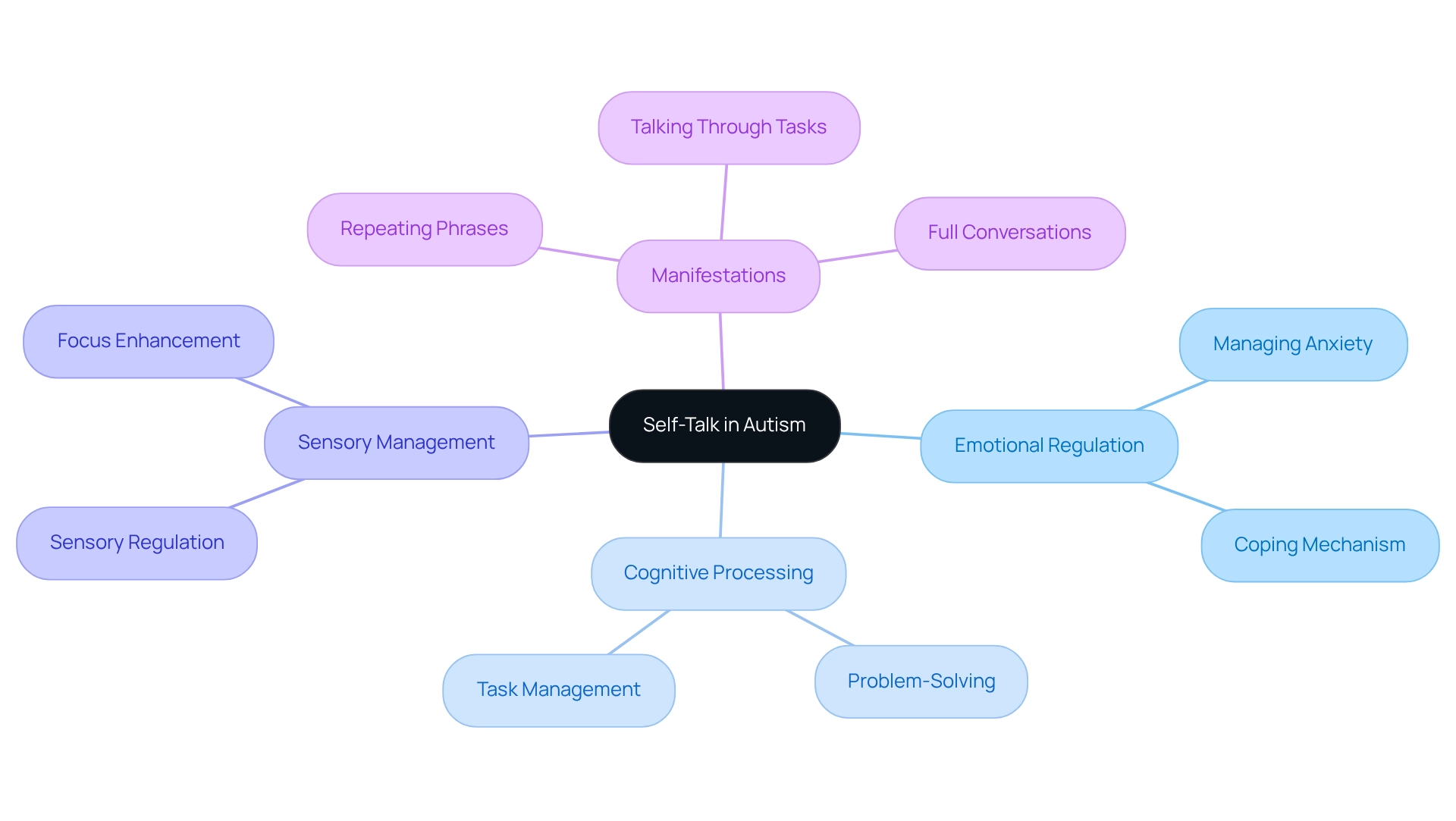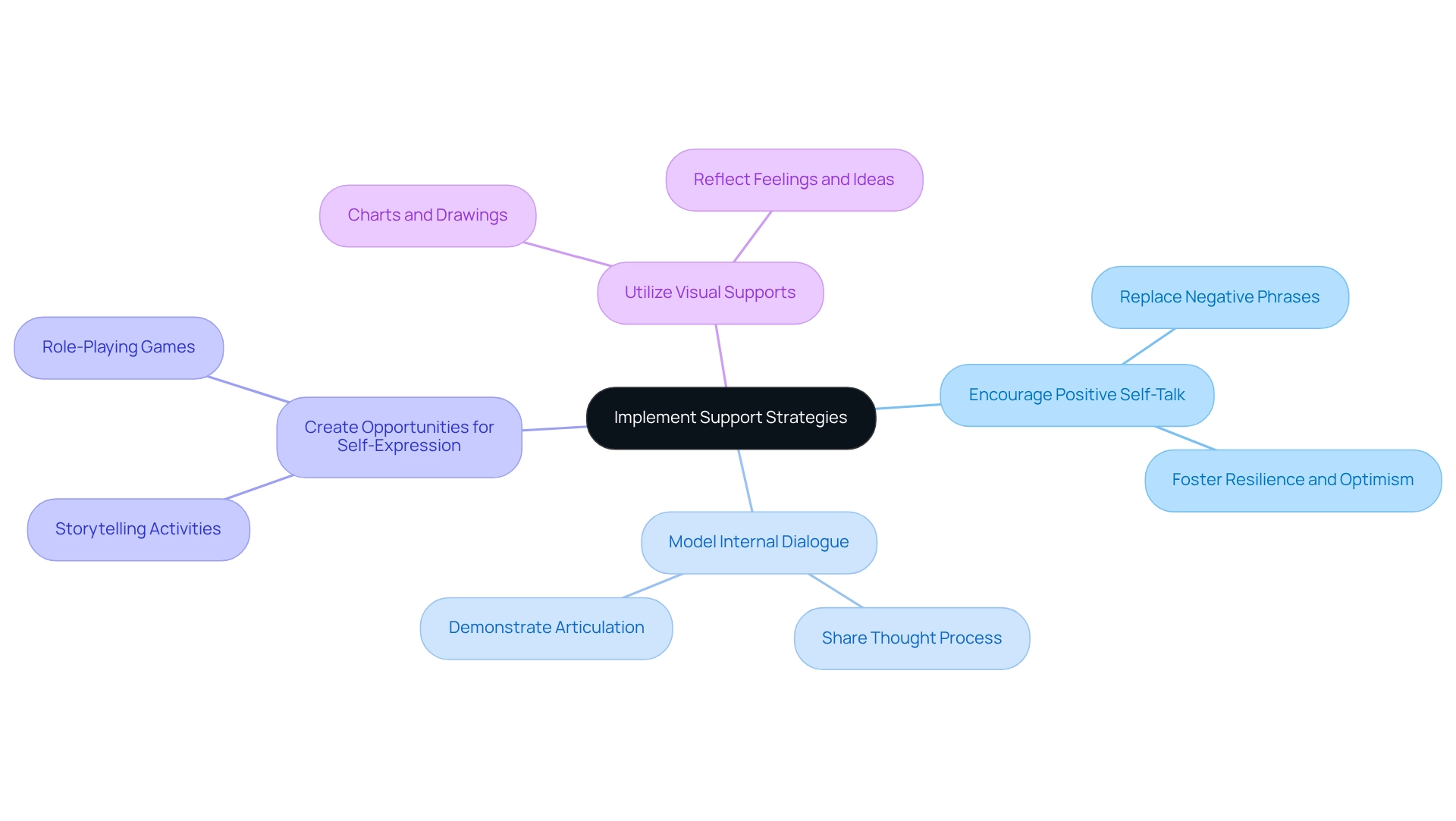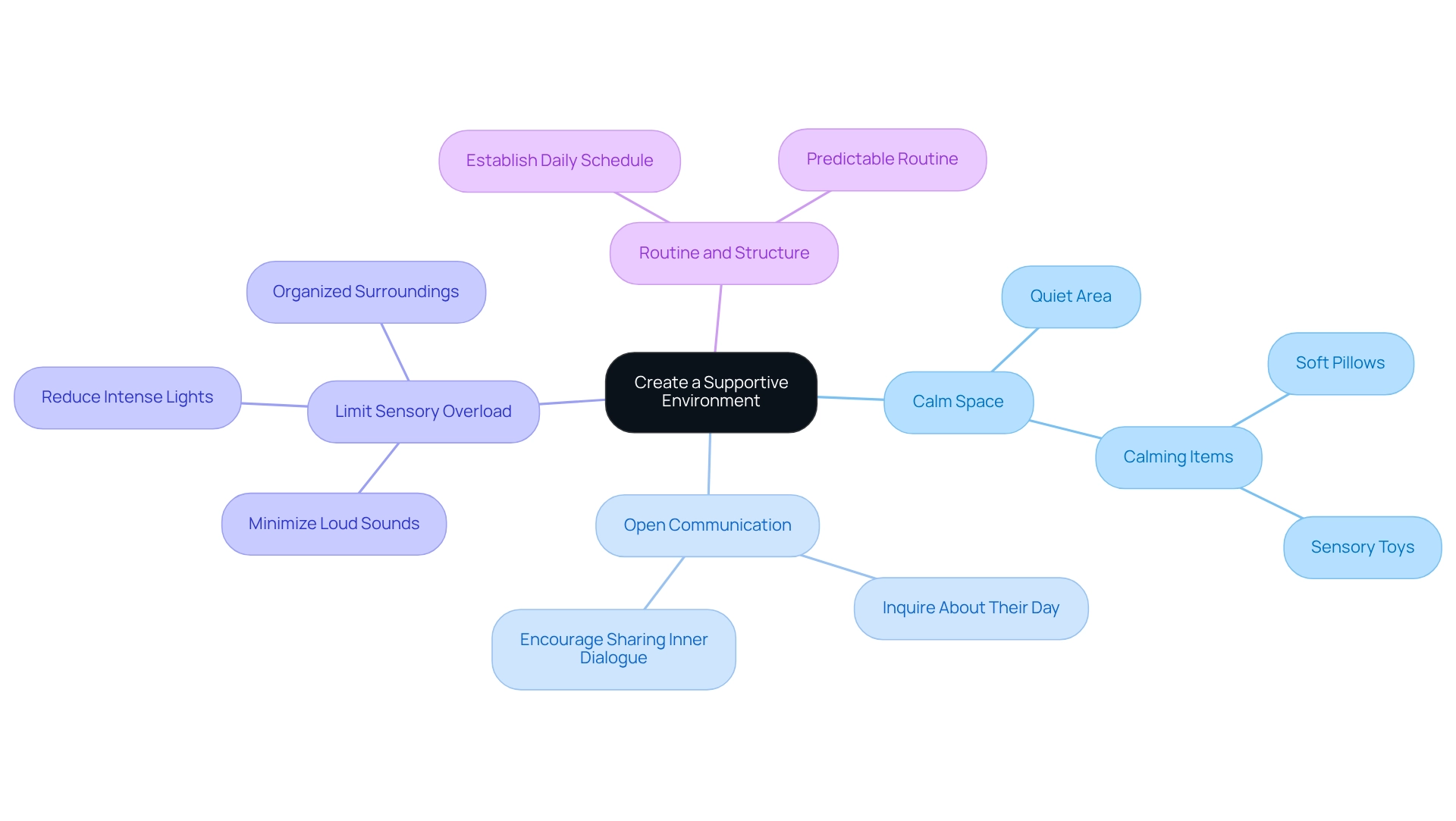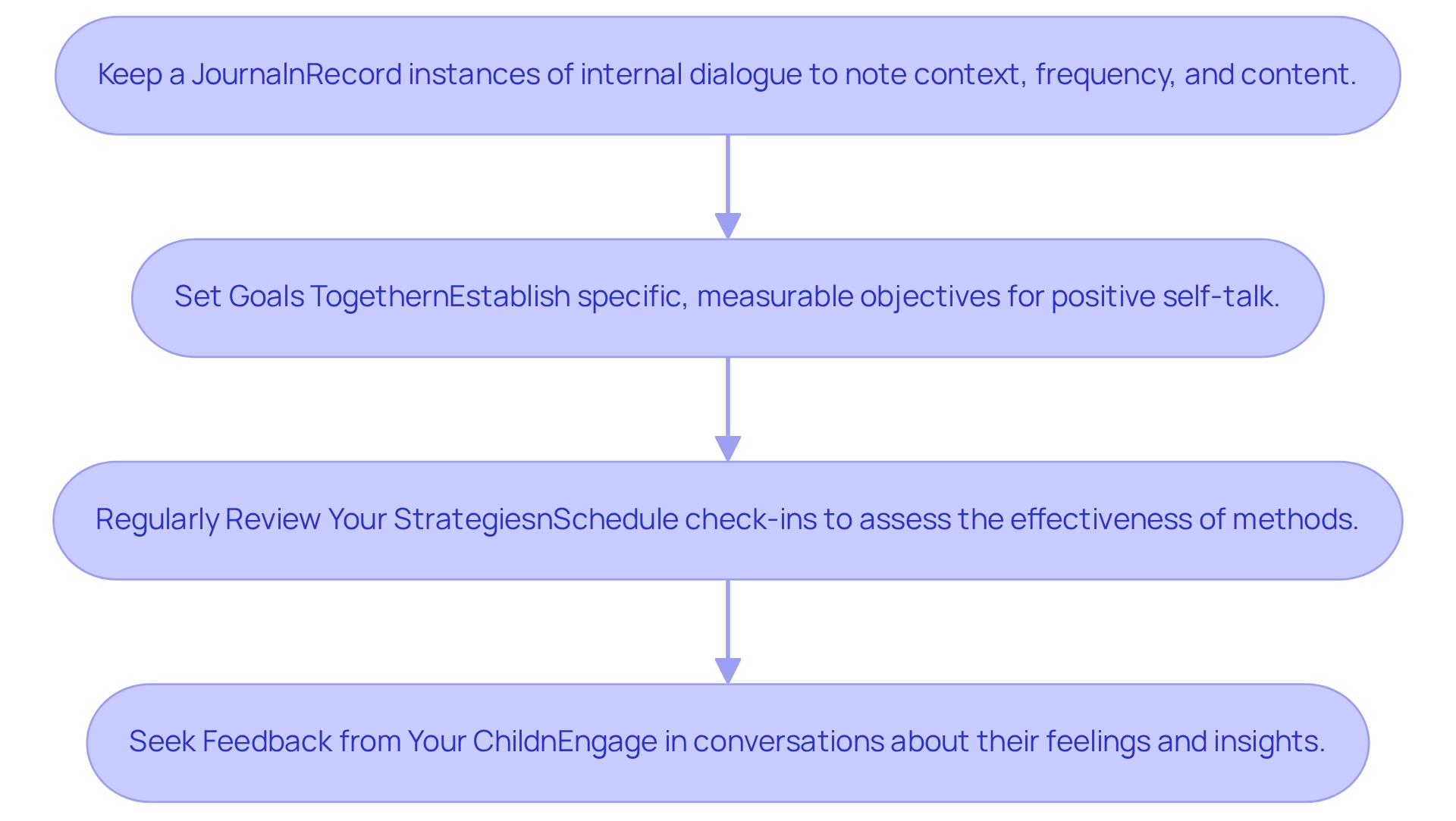Overview
This article serves as a compassionate guide for parents seeking to support their autistic child who often engages in self-talk. Understanding that this behavior is crucial for emotional regulation and cognitive processing is the first step. By encouraging positive self-talk, modeling internal dialogue, and creating a nurturing environment, parents can empower their children to navigate their inner dialogue effectively. This not only fosters emotional well-being but also builds confidence.
Imagine a moment when your child is lost in their thoughts, perhaps talking to themselves. This self-talk is more than just a quirk; it’s a vital tool for processing feelings and experiences. By recognizing its significance, you can better support your child. Consider sharing your own experiences with self-talk, or ask your child about their thoughts—these conversations can strengthen your bond.
To truly make a difference, implement strategies that resonate with your child’s unique needs. Encourage them to express their feelings through positive self-talk. Model this behavior yourself—let them see you engage in internal dialogue, perhaps while solving a problem or reflecting on your day. Creating a supportive and understanding atmosphere at home will help them feel safe to explore their thoughts.
As you embark on this journey together, remember that you are not alone. Many parents face similar challenges and triumphs. Share your experiences in the comments or through newsletters; your story may inspire others. By fostering an open dialogue, you create a community of support that benefits everyone involved.
Take action today by exploring resources that can further assist you in this journey. Together, you can cultivate an environment where your child thrives emotionally and confidently, embracing their unique way of processing the world around them.
Introduction
In the intricate world of autism, self-talk stands out as a vital behavior that fulfills essential functions, including emotional regulation and cognitive processing. For many autistic individuals, this internal dialogue is not merely a quirky habit; it serves as a crucial tool for navigating daily challenges and managing sensory experiences.
By understanding the importance of self-talk, parents can empower themselves to better support their children, creating an environment where this practice is embraced rather than overlooked.
As research highlights the benefits of self-talk in problem-solving and anxiety management, it becomes increasingly clear that recognizing and nurturing this behavior is essential for enhancing the quality of life for autistic individuals.
Understand Self-Talk in Autism
Self-talk is a common behavior among autistic individuals, and an example of this is when an autistic child constantly talks to himself, serving multiple purposes such as emotional regulation, cognitive processing, and sensory management. It can manifest in various ways, such as when an autistic child constantly talks to himself, repeats phrases, talks through tasks, or even engages in full conversations with himself. Understanding that this internal dialogue is not merely a peculiarity but rather an essential resource for navigating the world can empower parents to support their children more effectively.
Research indicates that internal dialogue can significantly aid in problem-solving and help manage anxiety, highlighting its importance in the daily lives of many autistic individuals. By recognizing the factors that contribute to your child's internal dialogue, you can foster a more encouraging and supportive atmosphere. Consider sharing your experiences or thoughts on this topic, as connecting with others can provide valuable insights and strengthen your understanding.

Implement Support Strategies
To support your child’s self-talk, consider implementing the following nurturing strategies:
-
Encourage Positive Self-Talk: Teach your child to replace negative phrases with uplifting affirmations. For instance, if they express, 'I can't do this,' gently guide them to say, 'I will try my best.' This small shift can foster resilience and optimism.
-
Model Internal Dialogue: Exhibit your own internal dialogue during daily activities. Whether you’re cooking or tackling a challenge, share your thought process aloud. This demonstrates to your autistic child constantly talking to himself how to articulate their own ideas and feelings.
-
Create Opportunities for Self-Expression: Involve your little one in activities that encourage verbal expression, such as storytelling or role-playing games. These fun contexts allow the autistic child constantly talks to himself, which helps them practice personal dialogue and build confidence in their self-talk.
-
Utilize Visual Supports: Visual aids can be incredibly helpful for children in understanding and organizing their thoughts. Consider using charts or drawings that reflect their feelings or ideas, making it easier for them to express their self-talk in a tangible way.

Create a Supportive Environment
Creating a supportive environment for your child involves several key elements that can make a significant difference in their emotional well-being.
-
Establish a Calm Space: Consider designating a quiet area in your home where your child can retreat when feeling overwhelmed. This space should be free from distractions and equipped with calming items like soft pillows or sensory toys, providing a sanctuary for them to relax.
-
Encourage Open Communication: It’s essential to foster an atmosphere where your child feels comfortable expressing their thoughts and feelings. Regularly inquire about their day and motivate them, as the autistic child constantly talks to himself, to share their inner dialogue experiences. This practice not only strengthens your bond but also helps them articulate their emotions.
-
Limit Sensory Overload: Be mindful of the sensory inputs in your home. Minimizing loud sounds, intense lights, or disorderly surroundings can help reduce anxiety and prevent excessive inner dialogue. Creating a serene environment can greatly enhance their sense of security.
-
Promote Routine and Structure: Establishing a reliable daily schedule can provide your child with a sense of security and lessen anxiety. A predictable routine makes it easier for an autistic child constantly talks to himself to navigate his inner dialogue, allowing him to feel more in control of his emotions.
By implementing these strategies, you can create a nurturing atmosphere that supports your child's emotional health. Remember, every small change can contribute to a more peaceful and understanding home.

Monitor Progress and Adjust Strategies
To effectively monitor your child's progress with self-talk, consider these nurturing steps:
-
Keep a journal. By recording instances of internal dialogue, you’ll note the context, frequency, and content, especially when an autistic child constantly talks to himself. This practice can illuminate patterns and triggers, helping you understand why your autistic child constantly talks to himself while exploring his inner world.
-
Set goals together. Establish specific, measurable objectives related to their internal dialogue. For instance, aim for them to use positive self-talk in three different situations each week. This not only provides direction but also encourages growth.
-
Regularly review your strategies. Schedule check-ins to assess how well the methods you’ve implemented are working. Discuss what resonates with your child and what doesn’t, and remain open to exploring new approaches together.
-
Seek feedback from your child. Engage them in conversations about their feelings regarding how the autistic child constantly talks to himself. Their insights can offer valuable perspectives on their progress and highlight any additional support they may need. By fostering this dialogue, you strengthen your connection and support their emotional development.

Conclusion
Understanding self-talk in autism is essential, revealing its significance as more than just a behavioral quirk; it serves as a vital tool for emotional regulation, cognitive processing, and sensory management. By recognizing the multifaceted roles self-talk plays in the lives of autistic individuals, parents can better support their children in navigating daily challenges. Implementing supportive strategies, such as encouraging positive self-talk and creating opportunities for self-expression, fosters an environment where this internal dialogue is embraced.
Establishing a supportive environment is crucial for nurturing self-talk. A calm space, open communication, and a structured routine can significantly reduce anxiety, helping autistic individuals feel secure. Monitoring progress through journals and regular assessments allows parents to adapt their strategies, ensuring that the support provided remains effective and responsive to their child's evolving needs.
Ultimately, recognizing and nurturing self-talk not only enhances the quality of life for autistic individuals but also empowers parents to create a more understanding and supportive atmosphere. By embracing self-talk, families can cultivate resilience, promote emotional well-being, and foster a sense of agency in their children, making a profound difference in their daily lives.
Frequently Asked Questions
What is self-talk in the context of autistic individuals?
Self-talk refers to the behavior where autistic individuals, particularly children, talk to themselves. This can include repeating phrases, talking through tasks, or engaging in full conversations with themselves.
What purposes does self-talk serve for autistic individuals?
Self-talk serves multiple purposes such as emotional regulation, cognitive processing, and sensory management, helping autistic individuals navigate their daily experiences.
How can parents support their autistic children regarding self-talk?
Parents can support their children by understanding that self-talk is not just a peculiarity but an essential resource. By recognizing its importance, they can create a more encouraging and supportive atmosphere for their children.
What are the benefits of internal dialogue for autistic individuals?
Research indicates that internal dialogue can significantly aid in problem-solving and help manage anxiety, highlighting its importance in the daily lives of many autistic individuals.
How can sharing experiences related to self-talk be beneficial?
Sharing experiences or thoughts on self-talk can provide valuable insights and strengthen understanding, as connecting with others can foster a supportive community.




